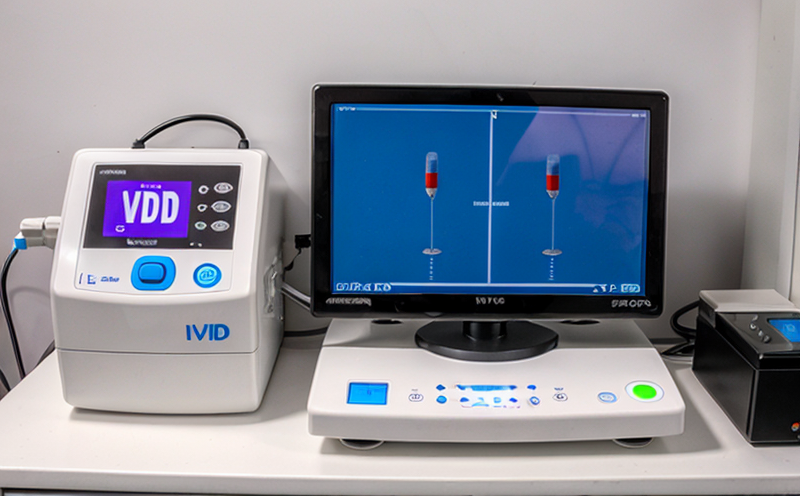Diagnostic Accuracy Testing for IVD Devices
The accuracy of In Vitro Diagnostic (IVD) devices is paramount in ensuring reliable healthcare outcomes. For medical device manufacturers and regulatory bodies, diagnostic accuracy testing represents a critical step in the quality control process. This service focuses on evaluating the performance characteristics that directly impact patient safety and treatment efficacy.
Diagnostic accuracy involves assessing several key parameters including specificity, sensitivity, predictive value positive (PVP), and negative (PNV). These metrics determine how well an IVD device can distinguish between those with and without a particular condition. In clinical practice, these tests are used to identify diseases or other medical conditions based on biological samples.
For quality managers and compliance officers, understanding the nuances of diagnostic accuracy is essential for ensuring that devices meet international standards such as ISO 13485:2016 and IEC 62366. These standards provide a framework for designing and manufacturing medical devices to ensure they are safe and effective.
Diagnostic accuracy testing typically involves several stages, starting with the selection of appropriate specimens which can vary widely depending on the type of test being conducted—blood, urine, saliva, etc. Specimen preparation is critical as it directly affects the outcome of the diagnostic tests. Instruments used in these processes include centrifuges for separating blood components or automated analyzers for precise quantification.
The testing itself involves exposing the device to a range of conditions that mimic real-world scenarios where accuracy might be challenged. This could include varying levels of target analytes, different matrix effects that can interfere with detection, and even extreme environmental conditions such as temperature fluctuations. The results are then compared against reference standards or gold standard devices.
Once the testing is complete, detailed reports are generated which outline the performance metrics mentioned earlier. These reports serve multiple purposes ranging from internal quality assurance to external regulatory submissions. They help in identifying potential issues early on so that corrective actions can be taken before products reach the market.
In addition to these technical aspects, it's important to consider ethical implications when conducting diagnostic accuracy tests. Ensuring patient privacy and data security is crucial throughout the testing process. Regulatory compliance also plays a significant role; adhering strictly to guidelines set forth by organizations like FDA or EMA ensures that your products meet all necessary requirements.
The importance of accurate diagnostics cannot be overstated in modern healthcare practices. By investing in robust diagnostic accuracy testing, manufacturers can build trust with healthcare providers and patients alike while reducing the risk associated with erroneous test results.
Scope and Methodology
| Aspect | Description |
|---|---|
| Specimen Preparation | Involves handling biological samples in accordance with established protocols to ensure consistency across tests. |
| Testing Conditions | Replicates real-world scenarios including varying levels of target analytes and environmental factors like temperature changes. |
| Data Collection | Involves systematic recording of test results for analysis against established criteria. |
| Reference Standards | Utilizes accepted reference methods or devices as benchmarks for comparison. |
The scope and methodology for diagnostic accuracy testing are meticulously designed to provide comprehensive insights into the performance of IVD devices. This ensures that every aspect influencing diagnostic outcomes is accounted for, thereby enhancing reliability and trustworthiness in medical diagnostics.
Methodologically speaking, this approach adheres closely to industry best practices outlined by relevant standards such as ISO 17025:2017 which governs the competence of testing laboratories. By following these guidelines rigorously, we ensure that our tests are not only accurate but also reproducible and repeatable.
Industry Applications
| Application | Description |
|---|---|
| Disease Detection | Early identification of diseases such as HIV, hepatitis C, and pregnancy through accurate tests. |
| Treatment Monitoring | Continuous monitoring of patients' responses to treatments like chemotherapy or immunotherapy. |
| Public Health Surveillance | Tracking the prevalence of infectious diseases within populations for better prevention strategies. |
| R&D Validation | Evaluating new diagnostic technologies and methodologies before market release. |
The application of diagnostic accuracy testing extends beyond individual patient care into broader public health initiatives. Accurate IVD devices play a crucial role in early detection, effective treatment, and overall health management across various sectors including hospitals, clinics, and public health agencies.
In disease detection, accurate tests can lead to timely interventions that could potentially save lives by catching conditions at their earliest stages. For treatment monitoring, precise diagnostics allow healthcare providers to adjust therapies based on real-time data, improving patient outcomes significantly.
Public health surveillance benefits greatly from reliable IVDs as they enable authorities to track trends and outbreaks accurately. This information is vital for developing targeted interventions aimed at controlling disease spread effectively.
R&D labs rely heavily on these tests during product development phases ensuring that innovations are not only innovative but also clinically validated before proceeding further into clinical trials or commercialization stages.
Competitive Advantage and Market Impact
Diagnostic accuracy testing offers significant competitive advantages in the medical device industry. By providing thorough evaluation of devices' performance characteristics, this service helps companies stand out by ensuring their products are among the most reliable available on the market.
Compliance with stringent regulatory requirements is essential for any manufacturer wishing to penetrate international markets. Our diagnostic accuracy testing ensures that all submissions meet or exceed these standards, opening up opportunities for global expansion.
Achieving high levels of diagnostic accuracy not only enhances product reputation but also fosters long-term customer relationships built on trust and satisfaction. Patients who receive accurate diagnoses are more likely to adhere to recommended treatments leading to better health outcomes overall.
From a market perspective, maintaining consistent quality through rigorous testing contributes to brand loyalty among healthcare professionals who increasingly rely on trusted brands when selecting diagnostic tools for their practices. Additionally, meeting regulatory demands early in the product lifecycle reduces costs associated with potential recalls or rejections late in development stages.





